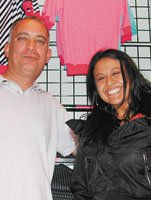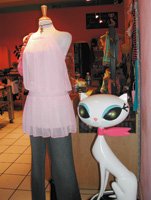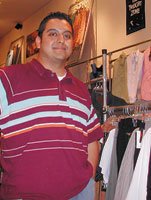Melrose Avenue Maintains Indie Cool
Partyers from across America swept through Melrose Avenue buying jeans and T-shirts during the NBA All-Star Game weekend in mid-February. They gave the venerable shopping enclave’s retailers a banner sales week, yet they might have missed the street’s significance. This row of shops is one of Los Angeles’ most powerful pop culture engines.
Melrose’s unique personality formed in the late 1970s, when vintage-clothing boutiques such as Flip’s and Aardvark’s challenged fashionistas to take charge of their style destinies by creating imaginative designs inspired by rock ’n’ roll and the spirit of the freewheeling Hollywood neighborhood.
By the 1980s, chi chi stores such as Tiziana, Ecru and Neo Romance had given the street a higher retail profile and created a schism in Melrose’s character that remains to this day. The boutiques are either gritty vintage and rock ’n’ roll wear or higher-end, fashion-forward retailers. Yet no matter what style momentarily dominates the block, most Melrose shopkeepers share one trait: Their vision is stubbornly independent.
Bill Ortiz, owner of the Twisted Elegance boutique on the corner of Melrose and Martel avenues, mixes independence and popular market trends in his 800-square-foot store. Dickies Girl’s pants have been one of his top sellers since he opened in June 2003, but he also feeds his independent streak by retailing Los Angeles designers. The store carries tank tops and off-the-shoulder blouses by Blue by Blue, jeans by Mavi, and denim brands Bartack and Bella Dahl, which have price points of $80 and $120, respectively.
Ortiz’s customers love Dickies and other denim brands not only for their comfortable-yet-close fit but also for their low-rise waists. “The lower the better,” Ortiz said.
Ortiz’s retail resume includes a stint working as the director of operations for Planet Funk between 1997 and 2002. He employs club kids like Jennifer Delg to clerk the store and buy clothes. His three-year plan is to open five more boutiques in the Los Angeles area.
“There’s no better business than retailing clothes,” Ortiz said. “The customers are always fun and hip.”
A few storefronts down, Lisa Sohn has owned and managed boutique Flirt for four years. Sohn said fun is the key to understanding Melrose retailing because the street’s customers are similar to a beach crowd.
“It’s busiest in summer,” said Sohn, a graduate of the Fashion Institute of Design & Merchandising in Los Angeles. “People come here to eat and to be outside.”
However, she has consistently drawn people into her 1,000- square-foot store to get first looks at one-of-a-kind pieces by designers such as Los Angeles–based Tyler Crowley.
Crowley’s $40 tank tops come in pink, black and white and have wildly different vintage ties that serve as straps. Toronto-based designer Itsus has also long been popular with her customers, who like the label’s clean-cut, bright colors and prints sporting the visages of pop culture heroes such as Edie Sedgwick.
Flirt favorites also include fitted tees from Atlanta’s Project E Clothing, which retail between $19.99 and $34.99. They’re popular, not only for the smile-inducing slogans on the shirts—like “Pick ’N’ Patch Strawberry Farm”—but also for their unique quality. Sohn guarantees the preshrunk shirt will never lose its fit, even more than a year after purchase.
While Sohn is a relative veteran of Melrose retailing, Unica Melrose’s Michael Amsalem is one of the old-timers. He’s been running the 1,200-square-foot store for more than 13 years and opened a 1,500-square-foot sister store U Melrose two years ago. While the street’s fortunes have waxed and waned over the past decade, his vision of retailing luxurious and unique labels has not changed.
For unique, there’s Los Angeles–based label Deviations, best known for making a jacket/dress by Amer Jabali. The designer said it was originally inspired by the 1980s film “Road Warrior,” but it would look right at home in “The Matrix.” Price points for Deviations range from $279 for a corset to $500 for the jacket/dress.
Paper, Denim & Cloth, a New York–based label that uses Italian and Japanese denim, has been a consistent top seller, Amsalem said. Also popular is cashmere sweater label RAW, which weaves into soft, high-quality material the skulls and lotus flower designs more often seen on T-shirts.
Rhinestone-studded jeans from Los Angeles–based Allen B. by Allen Schwartz, which retail for more than $269, and the aptly named Miami-based T-shirt line Bejeweled also grace Unica’s racks. However, Amsalem doesn’t ignore more modest budgets. He also retails pieces by Von Dutch, whose signature store is across the street.
Toward Melrose Avenue’s western edge lies Funky Revolution on the corner of Melrose and Spaulding avenues. This sister store to the Funky Revolution in Los Angeles’ Silverlake district opened in the area in October 2003. Price points often hover in the $15 to $28 range for jeans and T-shirts. As in the Silverlake store, the right-hand side of the Melrose store is dedicated to guys, while the left half is reserved for girls.
“It works like a club,” said Store Manager Ric Jimenez. “You got guys on one side and girls on the other, and they always come to the middle to socialize.”
On the girls’ side, the store retails Los Angeles designers such as Mimi Chica, whose collection includes a dark-plum swing-style skirt. Cargo pants by Los Angeles–based Kik Girl and workout pants by the Yogi label are also very popular. Plain shades and neutrals, however, are out, Jimenez said. “They’re picking anything that’s bright, like fuchsia, white, pink or anything with contrast stitching,” he said.
On the guys’ side, there’s a shift to a fashion focus, with labels such as Vernon, Calif.–based BC Ethic trying out a slimmer fit and lighter-weight fabrics for its men’s casual contemporary styles. Jimenez also noticed that guys are buying jeans with a dirtyfade or worn-out look that is also favored by the gals. Funky Revolution’s dirty-fade jeans are designed by labels such as E-Male.
Guys’ T-shirts with ringer collars and humorous logos have long been popular. Not to be outdone, girls are buying Doe/Ruby Glow T-shirts that come in similar colors and depict characters from Hello Kitty and Peanuts and Ouija Board–inspired graphics. Jimenez said the designs seem to fit anywhere but the spirit and humor is all Melrose Avenue.
























